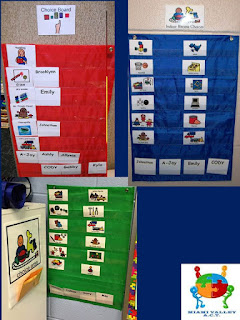For many classroom's the first step to a successful play and leisure time is a clearly defined area of the classroom. This helps students understand where to go for play and leisure time. Many classrooms designate this area with colorful rugs and shelves of toys.
 |
| Jessica Ward Rolling Hills Elementary, Northeastern |
 |
| Toni Mallot Jane Chance Elementary, Miamisburg |
The next step in organizing play and leisure time is having a clear system for students to decide what they want to play. Many classrooms use choice boards for student to choose one activity which must be cleaned up before choosing another activity. This can prevent the area from getting too messy and avoids various activity materials getting mixed up. It is also a way to communicate what activities are allowed the be played with at a given time and which are off limits. This is especially useful when using certain activities as reinforcers and not allowing students to have free access to them during other times.
 |
| Choice Board for Preferred Music Videos Rick Wical Ankeney Middle School, Beavercreek |
 |
| Emily Ottmar Stevenson Elementary, Mad River Local Schools |
 |
| Emily Ottmar Stevenson Elementary, Mad River Local Schools |
 |
| Pocket Chart Choice Boards Activities vary between Choice Time and Indoor Recess |
Many teachers organize materials within the location using shelving or hanging organizers.
 |
| Sensory Tubs Toni Mallot Jane Chance Elementary, Miamisburg |
 |
| iPad bins containing labeled iPads and headphones |
 |
| High Interest Magazines for High School Students Jody Chick Yellow Springs High School, Yellow Springs |
 |
| Hanging Shoe Organizer to Store Movies |
 |
| Becky Schwab Eastmont Elementary, Dayton Public Schools |
 |
| 12-Block Organizer Bins Labeled with Baseball Card Protectors |
 |
| Hanging Shoe Organizer for Headphones Laura Brown Perrin Woods Elementary, Springfield |
For many students, play and leisure time is the most preferred time of day! This can make waiting or transitioning back to work a challenge. We suggest using a visual countdown or visual countdown spinner to help with the transition. This is a great tool to cue these transitions and provide ample warning that the transition is coming. As the adult anticipates an upcoming transition, the adult begins the countdown by placing a picture of the upcoming activity at the bottom of the countdown. As the transition time approaches, the adult removes the numbers, beginning with 5 and progressing on down until the transition picture is reached. The unique aspect of the visual countdown is that the adult maintains control of the timetable, whereas with a visual timer, the time elapses on its own from the fixed increments of mechanical movement in the timer. Thus, the visual countdown allows more control and flexibility for the adult facilitating the transition. When using the countdown it is important to use it when transitioning from a preferred to a nonpreferred activity (when it is time to clean up) but also when transitioning from a nonpreferred to a preferred activity (when waiting for play time) so that it doesn’t develop a negative association. We suggest this tool any time you are trying to communicate the passing of time to a student. Provide a lot of reinforcement at first for use of this tool to get buy-in.
Additionally, use physical boundaries to help students better understand when play and leisure time is not accessible.
 |
| Rolling Shelf with Lock to Close Amy Beanblossom Arcanum Elementary, Arcanum |
 |
| Mrs. P's Specialties |
 |
| Reversed Pocket Chart with Visual Blocking 12-Blocks Shelf |





No comments:
Post a Comment